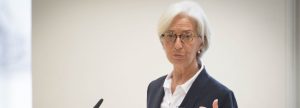Lagarde Cautions Policymakers of Volatility in Financial Markets
IMF chief: Many jobs will be affected one way or another. Some of them will disappear, but many more will be affected because of automation. So we need to think about the future of work
Reported by HPMM Group according to FINANCIAL TRIBUNE ; Central banks need to stay vigilant as uncertainty remains over the impact of the normalization of monetary policies in advanced economies, International Monetary Fund Managing Director Christine Lagarde said.
“We have known for some time that this is coming, but it remains uncertain as to how exactly it will affect companies, jobs, and incomes,” Lagarde told a conference in Jakarta, Indonesia, on Tuesday. “Clearly, policymakers need to stay vigilant about the likely effects on financial stability, including the prospect of volatile capital flows,” Bloomberg reported.
Stock markets from the US to Asia were in turmoil in recent weeks on concerns that the US could raise interest rates at a faster pace than previously thought. Investors were awaiting Jerome Powell’s first public comments in the role of Federal Reserve chairman on Tuesday.
The global economy is on a broad-based upswing, involving about two-thirds of the world, and it offers an opportunity to reform financial markets, upgrade labor laws, and lower barriers to entry in overly protected industries, Lagarde said. The IMF forecasts global economic growth of 3.9% this year and in 2019.
“As I have been saying recently, the time to repair the roof is when the sun is shining,” Lagarde said. “Repairing the roof also means using fiscal reforms to generate higher public revenues, where needed, and improve spending. By boosting public finances, countries can increase infrastructure investment and development spending, especially on social safety nets for the most vulnerable.”
While lauding countries in Southeast Asia for building stronger economic foundations, Lagarde called for adoption of technology to harness the demographic dividend and greater inclusion of women in the workforce.
Need for New Growth Models
Lagarde, speaking to the IMF conference in Jakarta in preparation for the fund’s annual meetings in Bali in October, said, ASEAN countries were preparing for higher interest rates in advanced economies such as the United States and Europe.
ASEAN countries need to embrace new growth models that put a greater emphasis on domestic demand, regional trade and economic diversification and prepare for technological changes such as increased factory automation, artificial intelligence, biotechnology, new financial technologies and digital currencies.
While these could eliminate some jobs, it was important for countries to boost efforts to educate workers to better prepare them to take advantage of new technologies.
“Many jobs will be affected one way or another. Some of them will disappear, but many more will be affected because of automation. So we need to think about the future of work,” Lagarde said, adding that there was no single approach, and many countries will forge their own path, imf.org reported.
She highlighted Go-Jek, the fast-growing motorcycle hailing and delivery service in Indonesia as an example of a country-specific technology innovation targeted to the country’s needs and workforce.
Indonesia and its ASEAN partners have been successful in creating vibrant middle classes, opening the doors to higher living standards for millions of people. By generating strong growth over the past two decades, they have also become key drivers of the global economy.
Their success is no accident. It is about implementing strong policy frameworks, drawing lessons from the past, and embracing change and openness. All that work has paid off.
ASEAN Way
“The world can learn so much from this region—including the so-called “ASEAN way” of reaching across borders. It is, in my view, beautifully captured in the Indonesian phrase, ‘gotong royong’, ‘working together to achieve a common goal’,” she said.
That spirit also lies at the heart of the IMF. In this region and across the world, the fund is working in partnership with our member countries to achieve a common goal—building economies that are fit for the future.
There is good news also in Indonesia, where growth is projected to reach 5.3% in 2018, and rise gradually over the medium term. This momentum can lead to further increases in economic and social wellbeing.
Indonesia can be proud of the progress achieved. Over the past two decades, poverty levels have declined by almost 40%; life expectancy has increased by more than 6%; and the number of people with tertiary schooling has increased by 250%, she said.
These achievements are representative of the positive trends across ASEAN countries.







